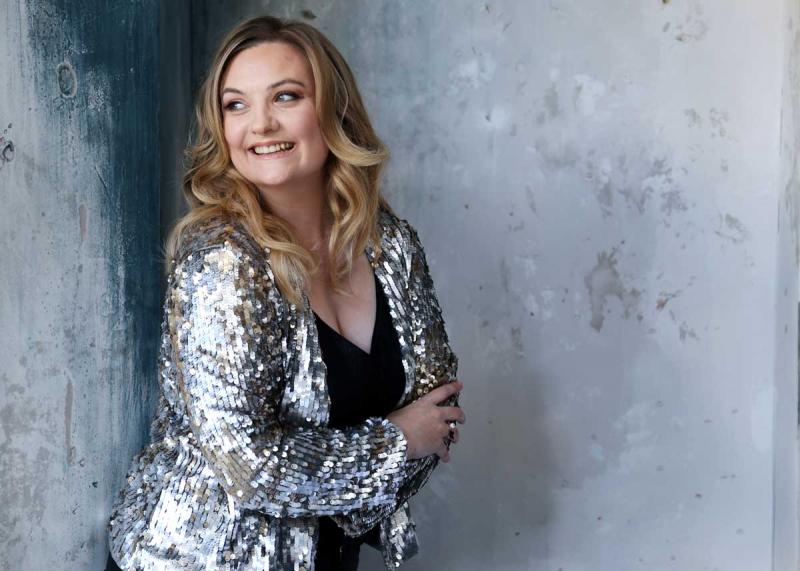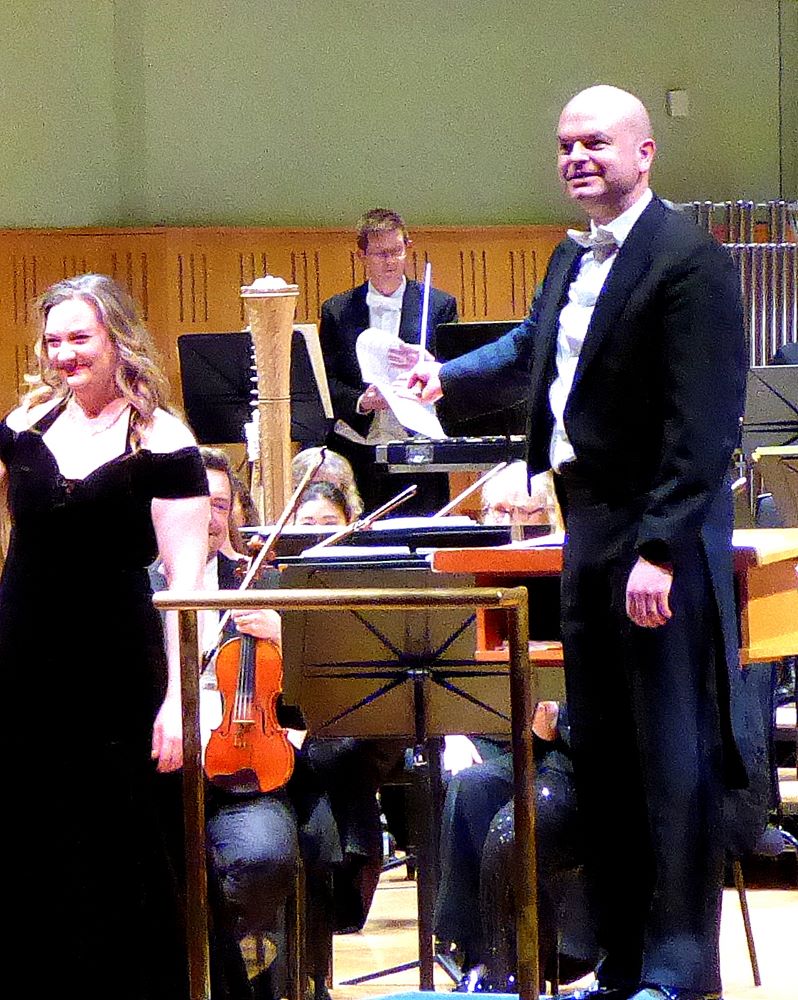Davis, National Symphony Orchestra, Maloney, National Concert Hall, Dublin review - operetta in excelsis | reviews, news & interviews
Davis, National Symphony Orchestra, Maloney, National Concert Hall, Dublin review - operetta in excelsis
Davis, National Symphony Orchestra, Maloney, National Concert Hall, Dublin review - operetta in excelsis
World-class soprano provides the wow factor in fascinating mostly-Viennese programme

In one sense it was a New Year’s Day “nearly”, just stopping short of giving us the already great Irish lyric-dramatic soprano Jennifer Davis in the music of the man she was born to sing, Richard Strauss. Berlin will witness her Arabella shortly, but the one Bavarian intruder in the otherwise all-Viennese carnival yesterday afternoon, the Moonlight Music from Capriccio, stopped before the Countess’s final scene.
Yet that slice of heaven still served as a breath from another planet in a glittering programme: did the audience realise it was getting one of the world's best horn players, Alec Frank-Gemmill, to sound Strauss's last tribute to his father's instrument? And Davis raised Viennese operetta to the heights, characterising each of her heroines to perfection. The warm heroic glint of the world's current Elsa of choice - by all accounts she was a magnificent Leonore at the Royal Opera, too, but I couldn't face Tobias Kratzer's production again - made small gems shine.
You wouldn't want to sit through an entire operetta of this sort - I can't even face The Merry Widow in its entirety - but each aria showed the craftsmanship of the composer concerned. Lehár glitters, of course, and there was bittersweetness shining in "Einer wird kommen" from Der Zarewitsch, a worthy companion to Arabella's "Aber der Richtige" or Gershwin's "The Man I Love" in more than just the theme. An announcement was made that Davis had fallen sick overnight and begged our indulgence, but none was necessary from the minute she launched lustrously into Millöcker's "Ich schenk' mein Herz" from Die Dubarry, with its gorgeous portamentos.

But this was no mere operetta gala with bits in between. It kicked off Ireland's celebrations of Johann Strauss II's 200th anniversary with a very carefully chosen programme. Maybe the opening tziganery didn't quite manage the required panache. But that blossomed in the Persian March and the Thousand and One Nights Waltz. It soon became apparent that conductor Gavin Maloney (pictured above with Davis) had the true waltz lilt, the hesitations, the rubato necessary. That steered us across the dance floor again in the Fledermaus Overture's waltz (rollicking double-basses in support) and a misty-eyed On the Beautiful Blue Danube. It was a shame this had to be separated from the Capriccio Moonlight Music by RTÉ lyric fm chat, because those two had clearly been conceived as a pair - same key to start with (A major), same lovely horn colouring. An unbroken link should be thought of for future programming.
The racier numbers got more and more exuberant - quite a surprise to hear Josef Hellmesberger II's Danse diabolique, a real collector's item - and it was a joy to see the two kids in the balcony especially enthusiastic with their clapping-along to the Radetzky March. But it was still Davis's afternoon, and here's a hope for Irish National Opera's 2025-6 season - either Daphne or Arabella as Bruno Ravella's third Richard Strauss production here, please, as this radiant soprano is made for both leading roles.
The future of Arts Journalism
You can stop theartsdesk.com closing!
We urgently need financing to survive. Our fundraising drive has thus far raised £49,000 but we need to reach £100,000 or we will be forced to close. Please contribute here: https://gofund.me/c3f6033d
And if you can forward this information to anyone who might assist, we’d be grateful.

Subscribe to theartsdesk.com
Thank you for continuing to read our work on theartsdesk.com. For unlimited access to every article in its entirety, including our archive of more than 15,000 pieces, we're asking for £5 per month or £40 per year. We feel it's a very good deal, and hope you do too.
To take a subscription now simply click here.
And if you're looking for that extra gift for a friend or family member, why not treat them to a theartsdesk.com gift subscription?
more Classical music
 BBC Proms: Barruk, Norwegian Chamber Orchestra, Kuusisto review - vague incantations, precise laments
First-half mix of Sámi songs and string things falters, but Shostakovich scours the soul
BBC Proms: Barruk, Norwegian Chamber Orchestra, Kuusisto review - vague incantations, precise laments
First-half mix of Sámi songs and string things falters, but Shostakovich scours the soul
 BBC Proms: Alexander’s Feast, Irish Baroque Orchestra, Whelan review - rapturous Handel fills the space
Pure joy, with a touch of introspection, from a great ensemble and three superb soloists
BBC Proms: Alexander’s Feast, Irish Baroque Orchestra, Whelan review - rapturous Handel fills the space
Pure joy, with a touch of introspection, from a great ensemble and three superb soloists
 BBC Proms: Moore, LSO, Bancroft review - the freshness of morning wind and brass
English concert band music...and an outlier
BBC Proms: Moore, LSO, Bancroft review - the freshness of morning wind and brass
English concert band music...and an outlier
 Willis-Sørensen, Ukrainian Freedom Orchestra, Wilson, Cadogan Hall review - romantic resilience
Passion, and polish, from Kyiv's musical warriors
Willis-Sørensen, Ukrainian Freedom Orchestra, Wilson, Cadogan Hall review - romantic resilience
Passion, and polish, from Kyiv's musical warriors
 BBC Proms: Faust, Gewandhausorchester Leipzig, Nelsons review - grace, then grandeur
A great fiddler lightens a dense orchestral palette
BBC Proms: Faust, Gewandhausorchester Leipzig, Nelsons review - grace, then grandeur
A great fiddler lightens a dense orchestral palette
 BBC Proms: Jansen, Royal Concertgebouw Orchestra, Mäkelä review - confirming a phenomenon
Second Prom of a great orchestra and chief conductor in waiting never puts a foot wrong
BBC Proms: Jansen, Royal Concertgebouw Orchestra, Mäkelä review - confirming a phenomenon
Second Prom of a great orchestra and chief conductor in waiting never puts a foot wrong
 BBC Proms: Royal Concertgebouw Orchestra, Mäkelä review - defiantly introverted Mahler 5 gives food for thought
Chief Conductor in Waiting has supple, nuanced chemistry with a great orchestra
BBC Proms: Royal Concertgebouw Orchestra, Mäkelä review - defiantly introverted Mahler 5 gives food for thought
Chief Conductor in Waiting has supple, nuanced chemistry with a great orchestra
 Dunedin Consort, Butt / D’Angelo, Muñoz, Edinburgh International Festival 2025 review - tedious Handel, directionless song recital
Ho-hum 'comic' cantata, and a song recital needing more than a beautiful voice
Dunedin Consort, Butt / D’Angelo, Muñoz, Edinburgh International Festival 2025 review - tedious Handel, directionless song recital
Ho-hum 'comic' cantata, and a song recital needing more than a beautiful voice
 Classical CDs: Dungeons, microtones and psychic distress
This year's big anniversary celebrated with a pair of boxes, plus clarinets, pianos and sacred music
Classical CDs: Dungeons, microtones and psychic distress
This year's big anniversary celebrated with a pair of boxes, plus clarinets, pianos and sacred music
 BBC Proms: Liu, Philharmonia, Rouvali review - fine-tuned Tchaikovsky epic
Sounds perfectly finessed in a colourful cornucopia
BBC Proms: Liu, Philharmonia, Rouvali review - fine-tuned Tchaikovsky epic
Sounds perfectly finessed in a colourful cornucopia
 BBC Proms: Suor Angelica, LSO, Pappano review - earthly passion, heavenly grief
A Sister to remember blesses Puccini's convent tragedy
BBC Proms: Suor Angelica, LSO, Pappano review - earthly passion, heavenly grief
A Sister to remember blesses Puccini's convent tragedy
 BBC Proms: A Mass of Life, BBCSO, Elder review - a subtle guide to Delius's Nietzschean masterpiece
Mark Elder held back from blasting the audience with a wall of sound
BBC Proms: A Mass of Life, BBCSO, Elder review - a subtle guide to Delius's Nietzschean masterpiece
Mark Elder held back from blasting the audience with a wall of sound

Add comment